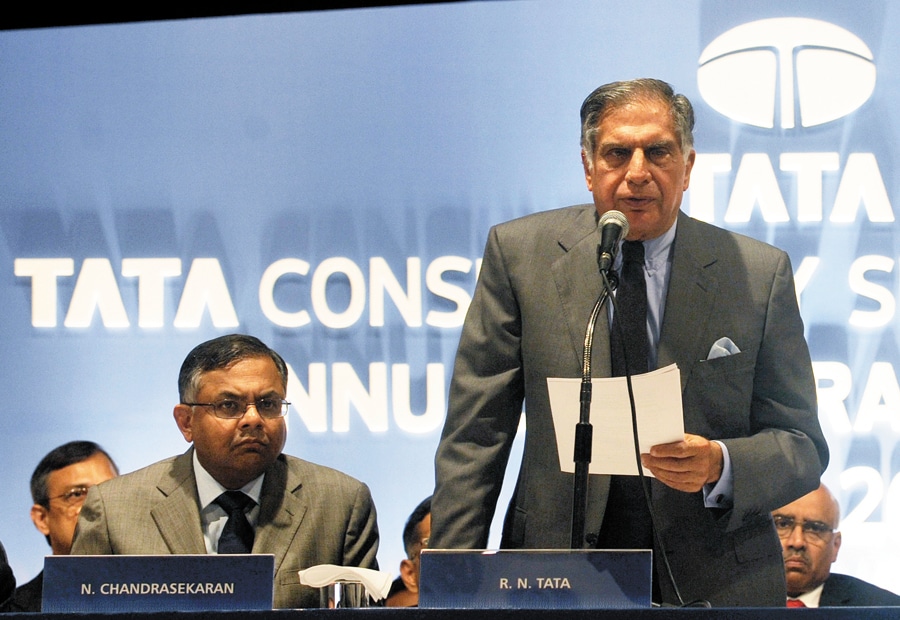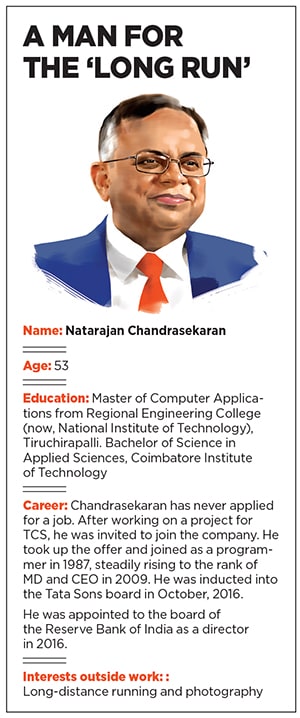N Chandrasekaran: Tata group's future-ready boss
Insider experience, credibility and a sound technological background made Tata group veteran N Chandrasekaran the unanimous choice for the top job at Tata Sons



Ratan Tata (right) with N Chandrasekaran during the annual general meeting of Tata Consultancy Services in Mumbai in 2012. Chandrasekaran took over as TCS chief in 2009 when the financial crisis was taking a toll on the Indian IT industry. Between then and 2015-16, TCS’s topline and market capitalisation have both tripled. His success is likely to make him acceptable as a fi gure of authority to Tata Sons’ senior leadership
Image: Punit Paranjpe / AFP / Getty Images
Over the last three months, corporate India has been divided on the fierce battle between ousted chairman Cyrus Mistry, directors of Tata Sons, the flagship holding firm of the Tata group, and trustees of the Tata Trusts, including Ratan Tata.
Yet, on January 12, when Tata Sons announced that it had selected a new chairman—N Chandrasekaran, the 53-year-old boss of the $103 billion-group’s most profitable and valuable company Tata Consultancy Services (TCS)—everyone agreed that the selection committee constituted to find Mistry’s successor had found the right man for the top job.
The selection committee comprised Tata Sons interim chairman Ratan Tata Venu Srinivasan, chairman of the TVS group Amit Chandra, managing director of Bain Capital former diplomat Ronen Sen and Sushanta Kumar Bhattacharyya, founder of the Warwick Manufacturing Group. The reasons for picking him are clear.
First, Chandra, as he is popularly known, having spent his entire career at TCS starting 1987, is a Tata group veteran. This will enable him to hit the ground running as he starts to lead the business into the future and address some of the pressing challenges at group companies like Tata Steel and Tata Motors.Second, he has a strong track record. As chief executive and managing director of TCS since 2009, Chandrasekaran has delivered the goods time and again. He took over from his predecessor, S Ramadorai, at TCS at a time when the global financial crisis was taking a toll on the Indian information technology (IT) industry. He steadied the ship, restructured the organisation that employs 3.71 lakh people into smaller and more focussed verticals to speed up decision-making, and it yielded results. Between 2009-10 and 2015-16, TCS’s topline has tripled to $16.5 billion its market capitalisation has also tripled to $70 billion in the same period.
Third, his success will make his acceptance as a figure of authority by the rest of the senior leadership of Tata Sons and various operating companies easier. Other stakeholders like employees and investors are known to regard him highly as well.
Fourth, a global conglomerate like the Tata group needs a globally recognised leader. Chandrasekaran fits the bill having spent years building relationships with the heads of some of the world’s largest companies that are TCS’s clients.
Fifth, while Chandrasekaran may have spent his entire career in IT (see box), he has a working knowledge of the way in which different businesses across verticals function since TCS’s clients cut across sectors such as manufacturing and services. They include ABB, British Airways, Scuderia Ferrari, Roche Pharma and Allianz Life.
For these reasons, Chandrasekaran became the top pick of the selection committee, which was considering other names including Ralf Speth, chief executive of Jaguar Land Rover and Harish Manwani, former chief operating officer of global consumer products giant Unilever.
Chandrasekaran is the seventh chairman of Tata Sons and the first non-Parsi to hold that post.
He is also the first person from outside the Tata family to join the Tata group as an executive and rise through the ranks to the corner office.
The other positive is Chandrasekaran’s age. At 53, he can potentially be Tata Sons chairman for the next two decades (the same tenure as Ratan Tata) at least, and that will ensure continuity of business plans. After Mistry was sacked in October, Ratan Tata came in as interim chairman to steady the ship and hold fort till the selection committee found a new chairman, for which it was given a period of four months.
Chandrasekaran’s appointment was a timely announcement as well. TCS announced a strong set of earnings for the third quarter of fiscal 2017 on the afternoon of January 12, amid a sluggish environment for the IT sector. Chandrasekaran fielded media queries at TCS’s headquarters in Mumbai’s Fort area and then made his way to Bombay House, a short distance away, for the Tata Sons board meeting: He was inducted into the Tata Sons board in October.
After news of his appointment as the business house’s new chairman was formally communicated to him, he returned to a standing ovation at TCS’s headquarters.
In a statement issued on January 12, Chandrasekaran said: “At the Tata group, we are at an inflection point. I am aware that this role comes with huge responsibilities. It will be my endeavour to help progress the group with the ethos, ethics and values that the Tata group has been built on.”
Commenting on the development, Kiran Mazumdar-Shaw, chairperson and managing director of Biocon, said, “Chandra has a stellar track record as a leader, and given the complexity of the Tata group including the current situation, it is a good move to appoint him chairman since he understands the ethos of the group well. This is also a validation of the importance of TCS as the flagship company of the group and the work he has done there. His experience of having worked with Ratan Tata will also be helpful.”
G Srinivasa Raghavan, chief executive of TVS & Sons, the flagship holding firm of the Chennai-based TVS Group, has worked closely with Chandrasekaran and reported to him for 14 years during his stint at TCS. Chandrasekaran is the ideal person to lead Tata Sons at this juncture, when the group is determining where it wants to be in the future, Raghavan says. The new chairman’s sound technological grounding will help the conglomerate reimagine legacy businesses that are being disrupted by technology. Raghavan credits the guidance and operational freedom that he got from Chandrasekaran as being the reasons for him to become the youngest vice president at TCS. “Chandra is someone who you can call at 11:30 at night for work and someone who you expect to call you at the same time,” says Raghavan. “He is humble and accessible and these values fit well with the Tata ethos. His leadership style is to empower people. He is good at spotting leaders and then giving them space to grow, while being available for guidance.”
The road ahead is fraught with challenges for Chandrasekaran, who is a passionate long-distance runner and has participated in marathons across the world. Not only will he have to fix troubled businesses like Tata Motors’ passenger vehicles division and Tata Steel’s European operations, but also lead the charge on behalf of the 149-year-old conglomerate in its fight against Mistry who has moved the National Company Law Tribunal (NCLT)—claiming mismanagement of the conglomerate and oppressions of non-promoter shareholders such as himself—against Tata Sons and the Tata Trusts (which own 66 percent of Tata Sons).
Owing to a trust deficit precipitated by irreconcilable differences of opinion on how the business should be run, the relationship between other directors of Tata Sons, which gets dividend from the profits of operating companies, and trustees of Tata Trusts, which gets dividend from Tata Sons for its philanthropic activities, broke down. This led to the fateful Tata Sons board meeting of October 24 where Mistry was sacked.
The Tata group has shown faith in Chandrasekaran’s abilities to see the conglomerate through this crisis, and this is evident from the fact that Ratan Tata had handpicked Chandrasekaran as one of the lieutenants in this battle. He was drafted to represent Tata Sons’ case to investors in India and abroad ahead of shareholder meetings called at operating companies to remove Mistry as their chairman.
“Chandra is an excellent choice. He is fully conversant with the value, culture and ethos of the Tata group,” says VR Mehta, a trustee of the Sir Dorabji Tata Trust, one of the two main trusts that are principal shareholders in Tata Sons. “This was one of the big issues in the past under the chairmanship of Mistry. Chandra’s appointment as chairman is a great re-assurance for all concerned, including the Trusts, that will look forward to a period of good growth under his leadership, which will yield steady dividend income for the charitable work that they do.”
Though Bombay House is just a short distance away from TCS’s headquarters, Chandrasekaran has traversed a three decade-long journey to get there. But as Tata Sons’ new boss, his marathon has just begun.
First Published: Jan 21, 2017, 06:34
Subscribe Now